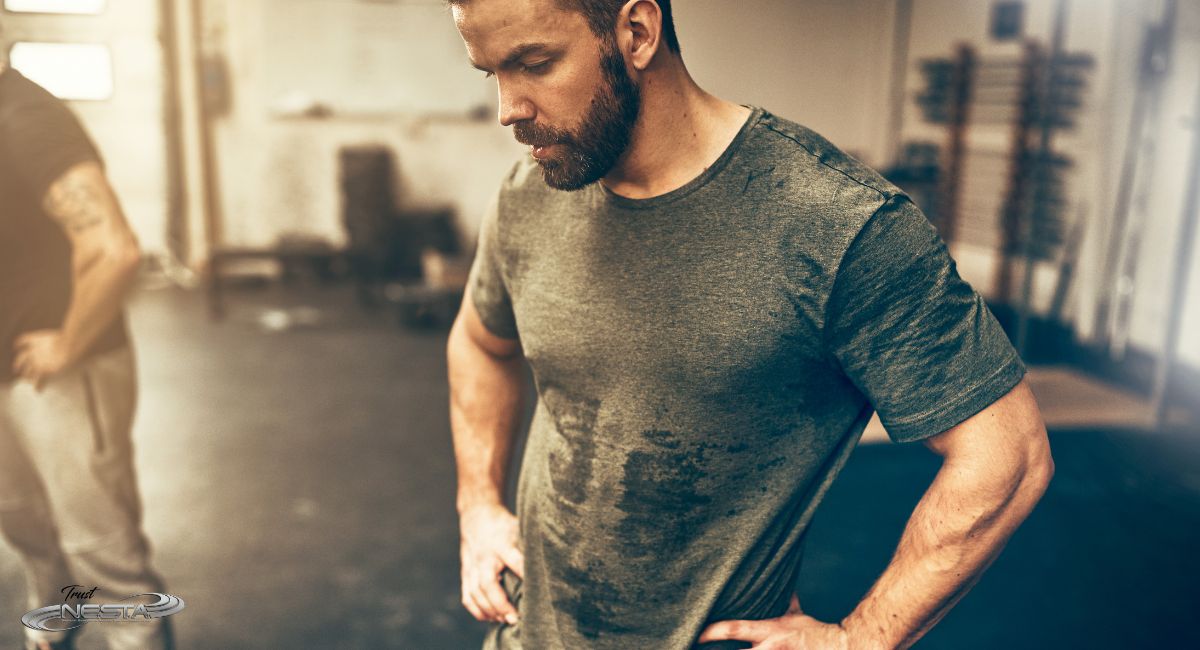Why do people hate sweating?
Sweating from exercise is something we all do, but it’s often seen as a nuisance. Sweating is a natural and necessary process that helps to keep your body cool and regulate your temperature, but many people still can’t stand it. Sweating can be embarrassing, and uncomfortable, and cause body odors, making it easy to understand why so many people hate it.
Sweating Can Be Uncomfortable
The sweat that comes out of your body can be uncomfortable and embarrassing, especially in situations where you’re trying to look your best. Sweat can make you feel uncomfortable and make it hard to concentrate, which can be a big problem in social situations. Sweating can lead to body odor, which can be unpleasant and embarrassing for many people. Not only can it make you smell bad, but it can also lead to other embarrassing situations, like an awkward handshake or a hug. Sweating can make you feel uncomfortable and sticky, especially in hot weather. It can also be a hassle to constantly have to reapply deodorant or antiperspirant to try to control the sweating. Some people also feel less attractive when sweating, especially in clothing that isn’t designed to wick away sweat.
Can I sweat too much?
Sweating profusely during a workout isn’t uncommon. Some people may sweat more than usual when they work out due to their level of exertion, the clothing they wear, or the indoor or outdoor temperature. But for others, a condition called hyperhidrosis might be the reason for excessive sweating during a workout.
Hyperhidrosis is the term for excessive sweating or sweating more than normal. People who have this condition don’t have more sweat glands than other people. Instead, the sympathetic nerve that controls sweating is oversensitive which, in turn, causes more sweating than normal. Hyperhidrosis affects approximately 4.8% of Americans, although it’s thought that this figure is likely higher
How much or how little you sweat doesn’t necessarily equate to the number of calories you burn or your exercise intensity. Other factors that may influence how much you sweat during exercise include:
- your gender (men tend to sweat more than women)
- your age (younger people tend to sweat more than older adults)
- your body weight
- genetics
- humidity levels
- the type of exercise you do
If you want to become more comfortable sweating, here are a few tips to help you.
Wear Light and Breathable Clothing: Choose clothing that is light and breathable, such as cotton or breathable synthetic fabrics like polyester. This will help your body regulate its temperature better and reduce the amount of sweat that accumulates on your skin.
Stay Hydrated: Drinking plenty of water throughout the day is essential for regulating your body temperature and keeping you from sweating excessively. Make sure to drink at least 8 glasses of water a day to stay hydrated.
Avoid Hot and Crowded Places: Try to avoid hot and crowded places, as these are known to cause people to sweat more. If you must go to a hot and crowded place, make sure to bring a bottle of water to keep yourself hydrated.
Use Antiperspirants: Antiperspirants are designed to help reduce sweating by blocking the sweat glands and preventing sweat from coming out. Be sure to choose an antiperspirant that is appropriate for your specific skin type.
Exercise Regularly: Exercise helps regulate your body temperature, so engaging in regular physical activity such as running, biking, or swimming can help you become more comfortable sweating.
Benefits of Sweating During Exercise
At the end of the day, sweating is a natural and necessary process and sweating from exercise actually has some major health benefits, and it’s important to understand why it’s so beneficial.
Sweating helps you regulate your body temperature.
As you exercise, your body temperature rises and sweating helps to cool you off. This prevents your body from getting too hot, which can be dangerous.
Sweat is one of the body’s most important mechanisms for regulating body temperature. Without it, the body would overheat and cause serious health issues. Sweating is the act of secreting fluid from the body’s sweat glands, which are located in the skin. This fluid, known as perspiration, is composed of water, salts, and small amounts of metabolic byproducts.
Sweat is released when the body’s temperature rises above its normal level. The hypothalamus, a part of the brain, is responsible for signaling the sweat glands to secrete sweat. This occurs because the hypothalamus senses a change in the body’s temperature and sends out a signal to the sweat glands, telling them to start producing sweat. This sweat is then released through the skin’s sweat pores, cooling the body as it evaporates.
Sweat is especially useful in hot environments, where the body needs to cool itself down quickly to avoid heat stroke. Sweating helps the body lose heat quickly and efficiently. Sweat also helps the body to maintain its normal temperature when it is exposed to intense physical activity, such as running or weight lifting.
Sweating also helps you lose excess water weight, which can be beneficial if you’re trying to lose weight.
Although sweating is an important process for regulating body temperature, it is important to remember that sweating too much can lead to dehydration. It is important to replenish fluids lost through sweating by drinking plenty of water throughout the day. Additionally, it is important to wear light, breathable clothing in hot weather to help the body sweat and cool down more efficiently.
Sweating during exercise can also help improve your circulation.
Sweating helps to move blood throughout the body, delivering oxygen and other important nutrients to cells and organs. It also helps to remove toxins from the body, which can reduce the risk of various illnesses and diseases. Sweating is caused by the body’s thermoregulation system, which triggers the sweat glands to produce sweat when the body is too hot. This sweat then evaporates and cools the body down. As the sweat evaporates, it takes with it some of the body’s heat, cooling the body down in the process. As the heat is removed from the body, the blood vessels dilate and increase blood flow, thus improving circulation. When a person sweats, the heart rate increases in order to pump more oxygen-rich blood to the body’s cells. This increased circulation helps to carry away toxins, improve muscle performance, and restore balance in the body.
Sweating during exercise can also help your skin by cleansing it of toxins and impurities.
Sweat contains minerals and electrolytes that can help nourish your skin, and the act of sweating can help unclog pores and reduce acne. Sweating is also beneficial for the skin. Sweat helps to flush out toxins and dead skin cells from the body, keeping the skin healthy and free from infection. Sweat also keeps the skin moisturized and supple.
Sweating helps reduce your chance of forming kidney stones.
We have already covered that sweating is an important bodily function that helps to regulate body temperature and eliminate toxins. It is also an effective way to reduce the risk of forming kidney stones. Kidney stones are hardened deposits of minerals and acid salts that form inside the kidneys. They can cause severe pain and other medical complications. Sweating helps to reduce the risk of developing kidney stones by increasing the excretion of minerals, such as calcium and oxalate, through the urine.
You know that sweating helps to regulate body temperature by allowing us to cool down. This is important because high body temperatures can cause kidney stones to form. When we sweat, our bodies excrete excess salts and minerals, which can reduce the concentration of minerals in the kidneys and help to prevent stones from forming. Additionally, when we sweat, it helps to flush out any toxins that may have built up in our bodies. These toxins can also increase the risk of kidney stones.
Second, sweating can also help to reduce the risk of kidney stones by increasing the excretion of minerals, such as calcium and oxalate, through the urine. Calcium and oxalate are two of the most common minerals found in kidney stones. By increasing the excretion of these minerals through the urine, it helps to reduce the concentration of them in the kidneys and reduces the risk of stones forming.
Finally, sweating is also beneficial for overall kidney health. As we sweat, our bodies excrete small amounts of water and electrolytes. This helps to maintain the proper balance of electrolytes in the body and keeps the kidneys functioning properly. Additionally, sweating can help to reduce stress and improve circulation to the kidneys. Both of these things can help to reduce the risk of developing kidney stones.
Sweating can also help reduce stress.
Sweating can also help you release negative emotions, which can be beneficial for overall mental health. Sweating is not only beneficial for circulation, but it also helps to reduce stress and anxiety. Exercising and sweating release endorphins, which are neurotransmitters that act as natural painkillers and mood enhancers. Endorphins help to reduce stress and anxiety, as well as improve overall mood.
Conclusion
So, as you can see, sweating from exercise is a good thing. It helps regulate your body temperature, improve circulation, cleanse your skin, and reduce stress. So next time you’re sweating from your workout, embrace it and be proud of the health benefits it brings.
Be on the lookout for future articles. You will also want to search through the archives of our blog because there are many other articles that go into great depth about dozens of other topics that will interest you.
Here are a few to check out now…
- Does Listening to Music Improve Your Workout?
- The Most Effective Method of Learning Anatomy as a Personal Trainer
- What Personal Trainers Will Want to Consider During a Client’s First Workout
There is always something exciting about earning a new training or coaching certification and applying that new knowledge of how you train your clients. This also helps you hit the reset button.
NESTA and Spencer Institute has been helping people like you since 1992. To date, over 65,000 people from around the world have benefited from our various certifications, programs, continuing education courses and business development systems. We are here for you now and in the future. Feel confident in your decision to work with us as you advance your knowledge and career. We are here for you each step of the way.
Click this link to see our complete list of programs (all of which qualify for CEUs for our programs and others).
That’s it for now.
Take action!
PS: Click here to see many helpful business/career resources







